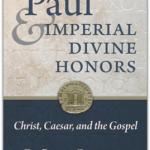Ephraim Radner’s dense studies are always sobering, and his recent A Brutal Unity: The Spiritual Politics of the Christian Church is no exception.
In a chapter chillingly titled “Division is Murder,” he exposes the complicity of Christians in political violence. Our ecclesial divisions may not cause violence, but Christian division provides a “magnifying coherence” to political, social, and other conflicts.
Commenting specifically on the church in Nazi German, he writes, “Division had . . . become simply a part of Christian self-understanding, comprehensively embedded into every aspect of ecclesial life over the formative practices of centuries.” All this was exposed in the 1930s and 40s, and inspired ecumenical efforts, but these “did nothing to alter the dynamics of Christian common witness in a place like Rwanda only a few decades later” (108).
Radner doesn’t flinch from raising the obvious, nearly unbearable question: “it is one thing to say that a history of division must inevitable undermine common witness; it is another to acknowledge that exposing such a history and its effects makes little difference: for to accept both is to accept the impotence of the gospel the Church proclaims and to raise suspicions of Christian duplicity in its enunciation” (108).















